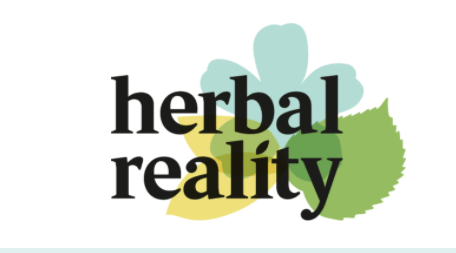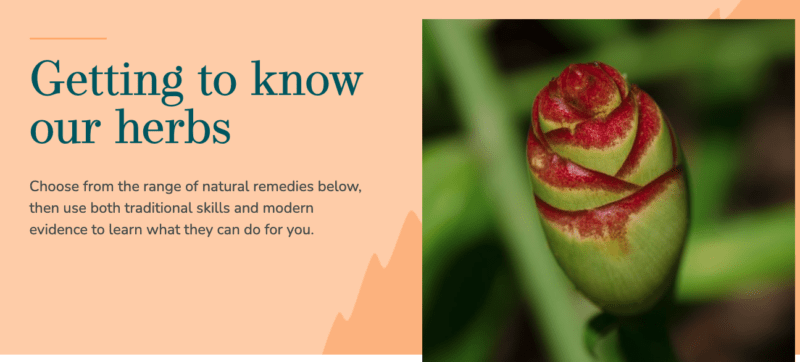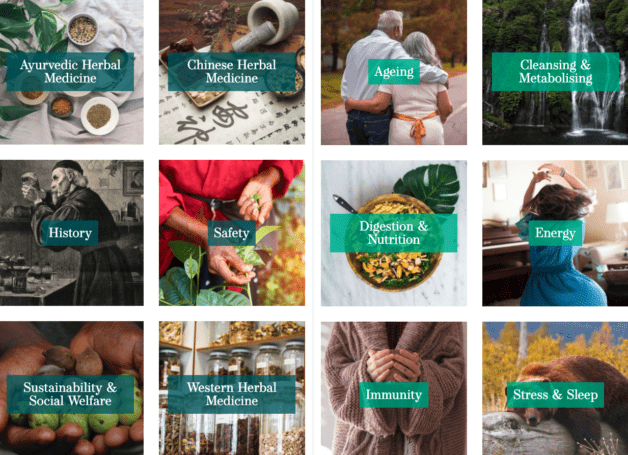Herbal Reality launched in 2020 in the UK to contribute to the conversation about herbal medicine and its place in society today. Founded by Sebastian Pole, herbalist and co-founder of organic herb company Pukka Herbs, Herbal Reality is curated by a group of herbalists and health experts aiming to connect people to herbalism and to be a reliable hub for knowledge both for practitioners and the public.
There is an incredible diversity of articles on the website, from plant monographs to posts focusing on Ayurveda, Chinese, and Western Herbalism, the history of herbal medicine, to those focusing on particular health conditions like immunity, digestion, and sleep. Unlike many sites on herbal medicine, there also is a section focusing on quality and sustainability, with in-depth articles written by individuals involved in this work for decades like Josef Brinckmann, Roy Upton, and others.
I spoke with Sebastian about why he created Herbal Reality and what he hopes it can accomplish.
Working with Nature
Sebastian began, “We know that herbalism can answer or help answer lots of the needs we have today, in terms of how we look after ourselves as a society, because it can be contributing to biodiversity, it can be contributing to sustainability. And perhaps its most significant contribution is to a preventative healthcare model. On one hand you can just be can be economic about it. In the UK, we spend 10% of our GDP on health. Is there a way to get more value out of that investment – and less suffering – if you educated people earlier on in some of simple self-care methods so readily available in the fundamentals of herbalism?
We’re working with nature. We’re not working with a machine that can be solely measured, monitored, and made into a reductionist piece. In optimizing people’s and planetary health we’re working with something dynamic, and that needs an integrated and holistic approach.”
Our Goal is to Educate and Inform
He continued, “I don’t think herbalism itself is that well defined. The herbal tradition is so broad and deep, it’s a hard nettle to grasp. In our time of access to so much information, how can we contribute to a genuinely journalistic presentation of the whole story of the herbal tradition? So, for example, we’ve got an article on pyrrolizidine alkaloids on the website. And on why ephedra has such a controversial history? And on why the EU banned kava kava? But also on drug over-prescribing and evidence based clinical solutions.
We focus on where herbs are a potential replacement for, or at least a better first choice than, drugs. We major on where herbalism can help fill the therapeutic gaps in modern healthcare.
I think a bit like yourselves at the Sustainable Herbs Program, we are creating a place to have some of the more difficult conversations and to look at contentious areas that need more discussion and urgent action. Our goal is to educate and to engage, to create positive change and better, more compassionate, healthcare.”
What Herbal Medicine Offers
Ann: Why do we need a website like Herbal Reality?
Sebastian: “At some level, everyone is interested in their health. We see a flowering of interest in natural health solutions. A lot of people are into making their own products and growing their own herbs. This is very positive. Yet, there is a lot of misinformation and confusion about we can use herbs, about what to look for in quality, about sourcing, and sustainability. Herbal Reality hopes to fill that gap. We are creating a place where clinicians and researchers can share their expertise and help contribute to a better informed public.
Given the environmental and health crisis, there is an unprecedented need for natural medicine. Yet we live in a world where herbal medicine is largely marginalized, access to herbalists is limited, and there is a climate of mistrust regarding herbs and herbal medicine.”
Why We are Confused
Sebastian continued, “For over 100 years herbal medicine has received minimal political and formal medical support, with many different health paradigms and regulations across the world restricting the impact herbalism can have. Most people can only access natural plant medicine using their own initiative and personal funds. Access to professional herbal clinicians is limited (e.g. approximately 4,000 herbalists in the UK for a population of 65 million). Poor quality media reporting has caused public confusion about the safety and efficacy of herbal medicine. On the one hand a plant can be the elixir of life on the other a poisoned chalice; it’s no wonder we are all confused.
Perhaps the herbal community could have done better in terms of consistent training standards, reliable quality control, demanding more ecologically sustainable herbs, and organizing ourselves as a powerful political and social force both nationally and globally? Whilst there are many, many fantastic projects and organizations, we still find ourselves at the edge. The herbal community finds itself divided and scattered by external and internal political forces.”
The Audience for Herbal Reality
Ann: Who is the website for?
Sebastian: “You can enter the website at different levels. A medical doctor who wants to find out the safety of some plants, or drug herb interactions, can find that information. Or journalists and members of the public can find information by topic or plant or specific condition.
I’ve seen plants change many people’s lives. And I’ve been so privileged in my journey with Pukka to work on deep sustainability within the herbal supply and value chain. However, sadly, I’ve become aware of a deep seated lack of knowledge about how to include the wisdom of herbalism to support your daily life. Most people have just not been educated or exposed to the practical benefits of herbalism. They don’t know about simple plants and practices they can include in their life that are affordable, and that are good for the fundamental workings of their health; helping digestion helping the nervous system, helping your reproductive cycles. Herbalism is a proven way to support your whole mind-body-spirit system to be at your best in life. It deserves a more significant role in wider healthcare practices.”
An Alternative to Dr. Google
He continued, “There is also confusion about what herbs and habits are right for us as individuals to develop and what is wrong? To be vegan or not, to hike in the hills or hit the gym, to take Rhodiola or Ashwagandha? Knowing when you can treat yourself and when you should see a herbalist is crucial. You take your car to a mechanic when it is broken. If your dog is ill, you take it to the vet. Well, what do we do? We go to Dr. Google. And so I guess you could say we are trying to contribute to the Dr. Google search to make sure there is reliable information available.”
Ann: Especially in the US, there’s so much information. So many herbalists are on social media and it can be hard to tell what is a reliable source. How are you making sure that the information you have is reliable?
Sebastian: “We have governance principles. And we have an herbal education research body that includes world leading herbalists qualified in all the main traditions. Beyond that, we make it reliable by sharing the facts, the experiences and insights of clinical herbalists and researchers. You obviously can’t write everything about every plant because there’s so much information. We can’t keep up with all the research. And so we focus on covering the main areas of safety, efficacy and sustainability.”
Vision for the Future
Sebastian continued, “I’ve been working quite a lot with theories of change, as you know. And asking: what are the cogs in the system that might be supporting and what might be hindering the success of herbalism? What in history has made the medical paradigm largely obstruct natural medicine? What keeps society from seeing herbal medicine as a sensible way of approaching health from the outset? We believe that we can transform that lack of respect for herbal medicine by: 1) presenting the biological plausibility for how herbalism works to academics and medical doctors; 2) focusing on quality standards and raising the safety profile of herbalism; 3) engaging in dialogue with the wider network of health professionals; 4) and perhaps most importantly of all, working together as one herbal community.
My dream is that when you go to school, right from the beginning, the principles of nature care, relationship care, and health care are integrated in your curriculum. When you study history, you study the history of medicine or the history of food along with the history of politics and war. And when you study science and chemistry, you also look at phytochemistry. You weave in tangible and relevant aspects of holistic healthcare into the curriculum.”
I encourage you to sign up for the Herbal Reality newsletter, join the conversation on social media, and, as Sebastian says, become a part of the reality you want to see in the world.




Comments